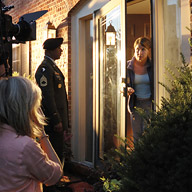
Training Program Packs Emotional Appeal
Leidos's Evocative Training is an innovative instructional program that helps military personnel discuss sensitive topics and potentially save lives in the process.
Telling someone that they've lost a loved one in war or talking about suicide prevention or sexual assault are emotionally grueling responsibilities that the men and women of our armed forces are routinely called upon to perform. Thanks to an innovative instructional technique developed by Science Applications International Corporation (Leidos), they're doing it very well and helping to save lives in the process.
Developed in 2005, Leidos's Evocative Training programs emphasize experiential learning to teach military personnel how to handle these highly sensitive responsibilities. The initial pilot program was developed for the U.S. Air Force to send airmen a sobering message about sexual assault.
Serious Material Requires Intense Drama
Seeking to engage audiences in the serious material, Leidos business unit Creative Director Kristin Westbrook and her colleagues designed a multimedia training program that included a dramatization of a scenario where a woman is sexually assaulted by a fellow airman after an off-duty party.
"Audiences are frequently reluctant to take sensitive-subject training," said Westbrook, who created the evocative training concept. "The subject matter is usually pretty grim, and servicemen and women are typically overloaded with mandatory training. We wanted to step outside of the mold and create a program that is different and memorable.
"It is all about helping our audiences connect with the material," she continued. "We want them to understand the subject and grasp the necessary training, but our intent is to move them beyond that to a place of empathy and compassion - a place that will prompt the right action."
 Evocative Training
Evocative Training
Leidos Creative Director Kristin Westbrook directs actors as Consulting Employee Wayne Westbrook operates a camera crane.
Many Voices Tell the Story
In addition to a drama, Leidos's Evocative Training courses typically include documentary interview footage from experts, peers, and others with experience and advice to share about the subject matter. In the case of the Air Force video, messages from the chief of staff of the Air Force and the chief master sergeant of the Air Force were included along with a commentary from an expert who explained the techniques employed by sexual predators.
"For training on sensitive subjects, the power of documentary interviews cannot be overemphasized," said Tom Tibor, lead script writer. "When we construct a documentary training video, we are careful to include a variety of voices and experiences so that the training participants can find someone they can relate to."
Leidos conducts focus groups with members of the target audience prior to filming. These groups give Leidos's writers and producers invaluable insights into how the actors in the film should speak and dress, and provide recommendations to lend believability to the plot.
"Accuracy and believability are critically important to the success of these dramas," said Westbrook. "If our audiences are distracted by an incorrectly decorated uniform or unnatural mannerism, the message gets lost in translation."
The Leidos-developed program also provided course modules with supplemental information about sexual assault, such as the impact of alcohol, the role of bystanders, and barriers to reporting abuse.
The Air Force sexual assault production has been shown to more than 360,000 people, and the technique has become the model for all subsequent Evocative Training programs.
For example, Leidos developed a training program to help U.S. Marine Corps personnel learn the responsibilities of a casualty assistance calls officer, or CACO. The program teaches Marines how to notify next-of-kin of a casualty with the utmost maturity, honor, and respect. It also provides instruction on the stages of grief and provides information on how to plan a funeral, connect with survivor services and benefits, and obtain a fallen Marine's personal effects.
Leidos has also produced suicide prevention programs for the Marines and the U.S. Army, poignantly addressing the seriousness and urgency of this issue while providing instruction on how to recognize risk factors and warning signs, intervene, and get the right help to save lives.
True Payoff Comes From Saving Warfighters
If client feedback is any indication, Leidos's Evocative Training technique is a success. Customers at the very highest levels of military leadership have expressed their appreciation for the programs, but the true testament has come from trainees themselves.
"This training package now offered is the best I have seen and compares to the level of professionalism and compassion we display in regard to our fallen Marines," reads a survey response from a Marine who completed a CACO training program designed by Leidos. "I was skeptical of the 'net' course, but I am a true believer in this one."
Leidos has won numerous awards for its Evocative Training programs, including two MarCom awards from the Association of Marketing and Communications Professionals, and a Thoth Award from the Public Relations Society of America. Its suicide prevention program for the Marine Corps garnered national attention with an article in USA Today.
For many who work on the programs, including Graphic Designer Roph Loch, the real reward comes from the good feeling that comes with helping others. "It's very fulfilling when you know that you are working on projects that literally help save lives."
Senior Program Manager Richard Rodriguez agreed. "We are proud of the work we are doing and are committed to exceptional quality because we are addressing some of the most emotionally challenging issues within the military," he said. "It is incredibly gratifying to know that we have made a difference in the lives of our warfighters."
